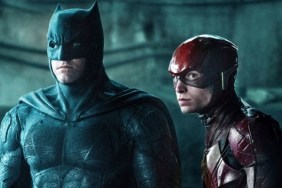
CraveOnline: I’ve always been fascinated by the post-apocalyptic future of the Mad Max movies, because you’re always a little vague about exactly what went down. Has your idea of what the tragedy was, and what the events were that led to this wasteland, changed over the years? Or is it always the same idea in your head of what happened?
George Miller: [Thinks.] It’s more or less the same. Sadly things haven’t changed too much in 30 years. [Laughs.] I mean, that was triggered by the oil crisis in 1972. I remember it really stuck in my mind, in a very peaceful city like Melbourne, our southern capital, or some city, it took ten days after a severe oil shortage for the first shot to be fired. And I thought, what if it went on? That was one of the things when we did the first Mad Max.
But it’s deliberately vague because it’s not about the apocalypse, it’s about creating a world in which people now regress to a more elemental state. They are now living in a neo medieval or Dark Ages, where there is no rule of law. So you can then, if you like, study people in a more… it allows you to distill humanity into a very simple thing, so it becomes allegorical. So this not pre-dated cinema, these sort of stories.
“From next Wednesday, all the bad things happen that we see on the news: economic collapse, power grids collapse, oil wars, water wars, and stuff no one ever saw coming.”
One of the reasons we did Fury Road is when I realized, again completely unexpected, that in Japan they saw him as a samurai. In Scandinavia they saw him as the lone viking. The French were the first to pick up that it’s a western on wheels. So we were into an archetype. It’s basically a western, and the westerns were basically – in whatever form, either the classic American or the spaghetti westerns – they were basically allegorical stories, and very spare in that way. That was very seductive for a storyteller.
Going back, going back to your original question, in this story everyone worked on the same rule: from next Wednesday, all the bad things happen that we see on the news: economic collapse, power grids collapse, oil wars, water wars, and stuff no one ever saw coming. So it’s that vague. [Laughs.] It often gets to you. You get blindsided, jump 45 years hence, and that’s the world.
We just found out there’s only about a year’s worth of water left in California. [Editor’s note: since this interview, it has been revealed that this report was somewhat exaggerated.] And I immediately thought to myself, “God damn it, now I have to trick out my car and get a mohawk.”
[Laughs.] Really? Just a year’s worth of water?
That’s what they say! We’ve had a severe drought now for over five years.
What happens? Ship it in?
I don’t know. But that’s always what happens. We’ve never had water in Los Angeles. Like in Chinatown. The whole point is we have to bring the water in, otherwise we don’t have a city.
A lot of the Gulf Wars are described as “oil wars,” and that was in Mad Max 2. They were the oil wars, based on the oil shortages of 1972, which always stuck in my head. That incident in Melbourne. But I went to India and they were talking about the war between Pakistan and India, the Kashmir, was basically a water war. It was over who controlled the resources. The water wars, and that sort of had a big influence over Fury Road.








